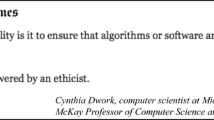Abstract
Researchers in virtually every discipline rely on sophisticated proprietary software for their work. However, some researchers are unable to afford the licenses and instead procure the software illegally. We discuss the prohibition of software piracy by intellectual property laws, and argue that the moral basis for the copyright law offers the possibility of cases where software piracy may be morally justified. The ethics codes that scientific institutions abide by are informed by a rule-consequentialist logic: by preserving personal rights to authored works, people able to do so will be incentivized to create. By showing that the law has this rule-consequentialist grounding, we suggest that scientists who blindly adopt their institutional ethics codes will commit themselves to accepting that software piracy could be morally justified, in some cases. We hope that this conclusion will spark debate over important tensions between ethics codes, copyright law, and the underlying moral basis for these regulations. We conclude by offering practical solutions (other than piracy) for researchers.
Similar content being viewed by others
References
Academic Computing and Communications Center, The University of Illinois at Chicago. (1999). UIC policy on software piracy. http://accc.uic.edu/policy/software-piracy. Accessed 25 Aug 2013.
Association for Computing Machinery. (1992). ACM Code of Ethics. http://www.acm.org/about/code-of-ethics. Accessed 27 Aug 2013.
Boyle, J. (2008). The public domain: Enclosing the commons of the mind. New Haven: Yale University Press.
Branscombe, A. (2013). Crowdfunding: What’s in it for scientists? Scientific American, September 30, 2013. http://blogs.scientificamerican.com/guest-blog/2013/09/30/crowdfunding-whats-in-it-for-scientists/. Accessed 3 Nov 2013.
Colbert, S. I., & Griffin, O. R. (1998). The impact of fair use in the higher education community: A necessary exception. Alb. L. Rev., 62(2), 437.
Douglas, D. (2011). The social disutility of software ownership. Science and Engineering Ethics, 17, 485–502.
Educause, EDUCOM Code. (1987). Using software: A guide to the ethical and legal use of software for members of the academic community. https://net.educause.edu/ir/library/html/code.html. Accessed 27 Aug 2013.
Faculty of Science, The University of Manitoba. Software policy. http://umanitoba.ca/faculties/science/staff/softwarepolicy.html. Accessed 27 Aug 2013.
Hettinger, E. C. (1989). Justifying intellectual property. Philosophy & Public Affairs, 18(1), 31–52.
Hick, D. H. (2008). The metaphysics and ethics of copyright. PhD dissertation, University of Maryland, College Park.
Himma, K. (2008). The justification of intellectual property rights: Contemporary philosophical disputes. Journal of the American Society for Information Science and Technology, 59, 1143–1161.
Limitations on exclusive rights: Fair use. Title 17 U.S. Code Sec. 107. http://www.law.cornell.edu/uscode/text/17/107. Accessed 3 Nov 2013.
Moore, A. (2003). Intellectual property, innovation, and social progress: The case against incentives based arguments. The Hamline Law Review, 26, 602–630.
Moore, A. (2008). Personality-based, rule-utilitarian, and Lockean justifications of intellectual property. In K. E. Himma & H. Tavani (Eds.), The handbook of information and computer ethics (pp. 105–130). Hoboken, NJ: Wiley.
Mutchler, C. (2013). Scientists discover ‘crowdfunding’ as a way of replacing research grants. The Washington Times, September 03, 2013. http://www.washingtontimes.com/news/2013. Accessed 3 Nov 2013.
Newark Computing Services, Rutgers, The State University of New Jersey at Newark. Computer use in labs (user policy). http://ncs.newark.rutgers.edu/userpolicy. Accessed 27 Aug 2013.
Nissenbaum, H. (1995). Should I copy my neighbor’s software? In D. G. Johnson & H. Nissenbaum (Eds.), Computers, ethics and social values (pp. 201–213). Englewood Cliffs, NJ: Prentice Hall.
Rahim, M., Mahbubur, R., Abd, M. N., & Seyal, A. H. (2000). Software piracy among academics: an empirical study in Brunei Darussalem. Information Management & Computer Security, 8(1), 14–26.
“Remedies for infringement: Damages and profits.” Title 17 U.S. Code Sec. 504. http://www.law.cornell.edu/uscode/text/17/504. Accessed 3 Nov 2013.
Shafer-Landau, R. (2010). The fundamentals of ethics. New York: Oxford University Press.
Shamoo, A. E., & Resnik, D. B. (2009). Responsible conduct of research. New York: Oxford University Press.
Sony Corporation of America v. Universal City Studios, Inc., 464 U.S. 417 (1984).
Stallman, R. (2001). “Science must push copyright aside.” GNU. http://www.gnu.org/philosophy/push-copyright-aside.html. Accessed 19 June 2014.
The OpenScience Project. “About OpenScience.” http://www.openscience.org/blog/?page_id=44. Accessed 3 Nov 2013.
Wickham, M., Plotnicki, J., & Athey, S. (1992). A survey of faculty attitudes toward personal computer software copying. The Journal of Computer Information Systems, 32(4), 47–52.
Author information
Authors and Affiliations
Corresponding author
Rights and permissions
About this article
Cite this article
Santillanes, G., Felder, R.M. Software Piracy in Research: A Moral Analysis. Sci Eng Ethics 21, 967–977 (2015). https://doi.org/10.1007/s11948-014-9573-5
Received:
Accepted:
Published:
Issue Date:
DOI: https://doi.org/10.1007/s11948-014-9573-5




